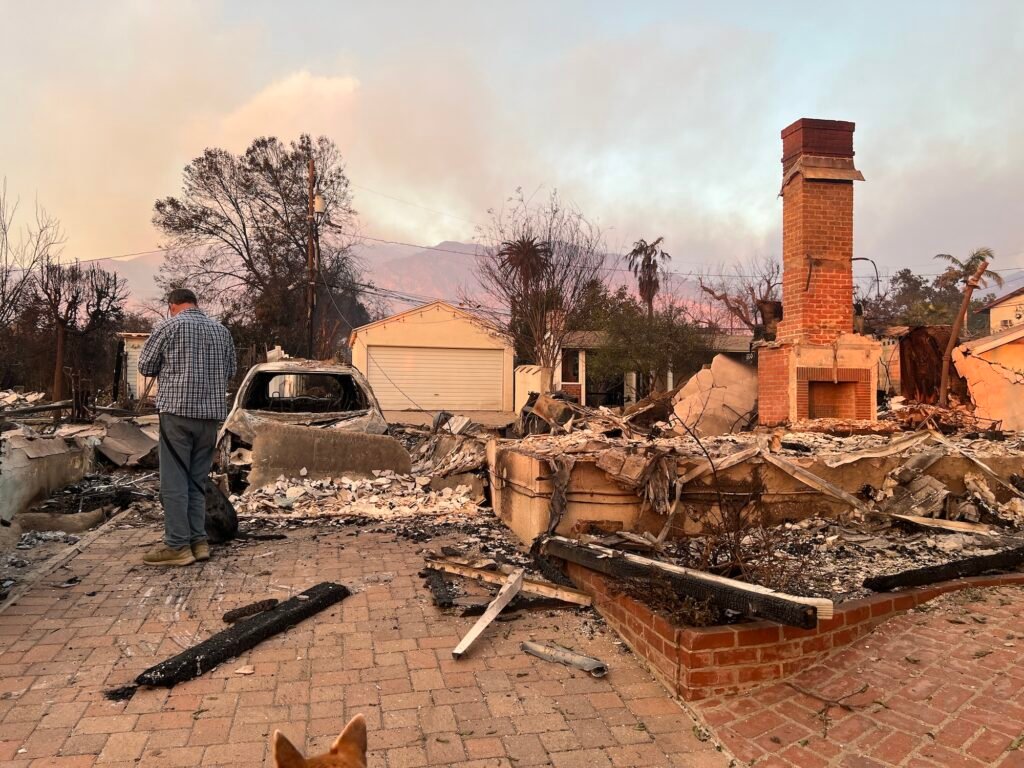Megafires – the fires with devastating effects to life, property, and ecosystems – are becoming more common. Their size, speed, and impact is increasing. Some of this is because of climate change, some of it is because of how we have managed our lands and build our homes and infrastructure.
I was the first person to quantify the likelihood of these extreme events in 2010 when the statistics were very challenging because the dataset was sparse. Since then, I’ve been in countless interviews with the media and consulted on dozens of top technologies for helping mitigate the impacts. I have been evacuated from my home three times in the 2003 Cedar Fire, the 2007 Witch Fire, and the 2020 Bobcat Fire. I have watched friends and neighbors lose their homes in all those fires and the 2021 Marshall Fire. It was just a matter of time before I experienced a loss.
In the 2025 Eaton Fire, I lost both my former rental home and the house I owned and lived in through infertility, engagement, and early marriage. While I did not experience financial damages, I did experience the emotional loss of my former community who helped me grow into adulthood.
You know what story is almost never told? The story about what happens when the flames are gone. Here is what you can expect.
Psychological Effects
There are psychological effects from major disasters that affect those who directly experience damages and those who are tangential to the event. Following the 2018 Camp Fire, many victims experienced Post-Traumatic Stress Disorder (PTSD) on par with veterans returning from war. These people are more susceptible to depression and anxiety.
Given my recent experience being diagnosed with major depressive disorder and generalized anxiety disorder with insomnia, I can attest that mental health can have ripple effects into the productivity of our workforce. Furthermore, the resources for treating these effects are severely limited and often blocked by many insurance companies or made cumbersome to avoid use of the program. For example, I cannot get mental health covered by the private market place health insurance plans in Colorado.
Remember that it is not merely the loss of material items, even those that can have emotional value, but also the community that you knew and called home.

Air Quality
Those who are fortunate enough to have a home to return to are looking at months of devastating air quality within their homes. You may think that because you’ve got hepa filters you are safe, but you likely aren’t. Toxins burned from urban building and plant materials can linger on surfaces outgassing into the air. As soon as you close your windows or the filters turn off, the air quality in your home will tank.
Water Quality
Water quality can be affected by both hazardous building materials and loss of vegetation leading to increased erosion. The 2012 High Park Fire near Fort Collins, Colorado affected water quality. Fortunately, the water treatment facility was able to filter to avoid impacts to drinking water. Long-term impacts affected the water quality for years to come as sediment backed up and was stored in backwater areas until big storm events up to five years later. During these acute events, the water facilities shut off until conditions improve.
Every Day Life
When you lose a home, there are many things that will affect your ability to return to life as before. Not only have you lost your home, but you should prepare yourself to deal with the bureaucratic battle of rebuilding your life. Even if you have insurance it can take years to pay out, and it is likely only to be a fraction of the total cost to you. The amount of work that you have to do to get any payout is very time consuming and emotionally draining.
If you don’t have insurance, or you are underinsured, you will have to work through the FEMA process, which is very slow and contingent on national budget planning.
When your home stays safe, but your neighbors’ homes burn, you are usually trapped in your home, unable to leave because your property value plummets. All the while you have to go to work and wake up every morning to see the horror that entered your life.
Material Clean Up
Remember that urban materials can include a lot of toxins including metals. Cleaning up is not as simple as getting a shovel and gloves. You must cover all your skin and wear an appropriate mask.
Cascading Disasters
When fire removes vegetation from hillsides, it not only increases erosion, but it increases the chance of future disasters such as debris flows, flooding, and mudslides/mud flows. Without devastating fires that kill vegetation, plants help absorb rainwater. Intense wildfire reduces plants and chars the soil to form a water repellent layer, blocking water absorption. During the next rainfall, water rolls off the surface. The steeper the slopes, the faster water runs off and increases chance of floods and land/mudsides.
Be prepared in coming months. If your home made it, make sure you have insurance against these other disasters.
